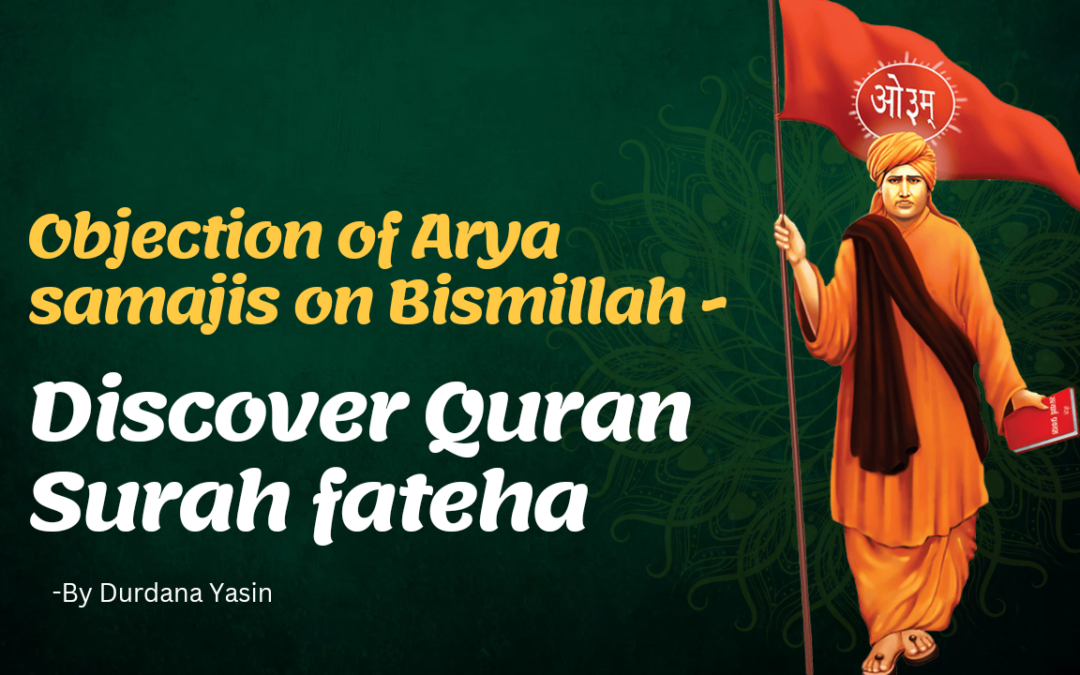STATUS OF BISMILLAH-IR-RAHMANI-R-RAHEEM IN QURAN
“Bismillah al-Rahman al-Rahim (In The Name of Allah The Most Gracious and The Most Merciful) is the first Ayah (verse) of the Quran. However, the scholars have several reservations with this Ayah. Some of them question whether it should even be considered the first Ayah. Others wonder if it is even a part of the Quran. Scholars even have varying opinions on whether the Prophet Muhammad (PBUH) had instructed others to write this Ayah in the Quran on his own.
“Bismillah al-Rahman al-Rahim” appears first in the Quran at the start of Surah Al-Fatiha, which is the first chapter of the Quran. In every era, scholars of Islam have unanimously acknowledged that Surah Al-Fatiha has 7 Ayahs. The evidence of this fact is present in the Quran: “And in fact, we have given you the seven oft-recited and the Grand Quran” (Al-Quran-15:87).
There are different commentaries and explanations of this Ayah as to what these seven “oft-recited” Ayahs are. According to the widely accepted analysis, it refers to Surah Al-Fatiha, which has seven Ayahs. These Ayahs are significant and are repeated numerous times during Salah (Namaz).
In most of the printed editions of the Quran, “Bismillah al-Rahman al-Rahim is mentioned as the first Ayah of Surah Al-Fatiha (Picture-1).

There are some Qurans in which “Bismillah…” is not mentioned as the first Ayah of Surah Al-Fatiha (Picture-2). Instead, “Alhamdulillah rabbil Aalameen” is the first Ayah. To complete the count of seven, the seventh Ayah of the picture-1 is divided into 2, the first half of it- “Siraat-al Ladzina An-amta alaihim” is considered as the sixth Ayah, and the second half is considered as the seventh Ayah. The symbol ٥ and ٦ below it (indicated by an arrow in picture 2) represent that it is the 6th Ayah, according to Imam Abu Hanifa.

Some scholars, including Imam Abu Hanifa (RA), do not consider “Bismillah…” to be a part of the Quran. According to him, it is an addition in the Qur’an which behaves like a separation between the two Surahs. Due to them, Surahs don’t get mixed up with each other and become readily identifiable. Since they follow this logic, some Hanafis, who represent a vast majority of Muslims worldwide, claim that the recitation of Bismillah is not compulsory in Salah. On the other hand, some consider it mandatory as it is an addition made by Prophet Muhammad (PBUH)].
There are two objections to Imam Abu Hanifa’s point-of-view-
Firstly, if its aim is separate two Surahs then, why is it present before Surah Al-Fatiha, which is the first Surah? There is no Surah before it that requires to be separated. According to this point of view, it would have been more appropriate to include it after Surah Al-Fatiha.
Secondly, why is it missing before Surah 9 Al-Taubah? Even though there is no Bismillah before Surah Al-Tauba, the community can quickly differentiate it from other Surahs. So, it can be inferred that another reason exists behind the inclusion of “Bismillah…”. It is not meant to be a separator.
Proof of “Bismillah…” being an Ayah of the Qur’an
Proof 1
All the Muslims agree upon the fact that Allah has promised to secure, preserve, and protect the Quran from any contamination. It has everything that Allah has intended to include in it and would never have anything otherwise. If we keep this in mind and analyze, we would find that there is no Quran written or printed so far that lacks “Bismillah…”. Even the people who believe that “Bismillah…” is not a part of the Quran have not been able to publish a Quran without this Ayah to date.
Some people claim that “Bismillah…” is always included in the Quran because the Prophet Muhammad (PBUH) had asked so. Note that Prophet Mohammad had also asked to recite “Aameen” after Surah Al-Fatiha, but no such Quran is published which mentions “Aameen” after this Surah.
Similarly, some scholars believe that there are about 1000 Ayahs in the Quran that have been revealed in different words. But to date, they have not been able to publish them in the Quran. This level of protection has been granted to the Quran by Allah. He will never allow anything to be included in it that is not right. The incorrect beliefs of people and scholars will not creep up in the Holy Book.
“Bismillah…” is always mentioned in printed editions of the Quran. Allah secures all Ayahs and, thus, we can deduce that “Bismillah…” is also a part of the Quran.
Proof 2
There was an American Egyptian Biochemist- Rashad Khalifa, in 1974, he discovered a numerical code in the Quran. He noticed that the Quran is bound by a 19 based numerical code that provides Quran foolproof security. According to him, Ayah 30 of Surah Al-Mudasser indicates towards this hidden code. He said that any change in the Quran would disturb this code. Therefore, it would easily be identified if some alteration has occurred. The whole Muslim world praised him for his contribution, and his work was published everywhere. Later on, he went astray and claimed prophethood. This declaration of his angered the Muslim world, which then abstained from mentioning and believing in his numerical code discovery as a deviation from a misguided person.
The thing that the Muslim world failed to realize is that Allah can also take the work of deen from his enemies. When an unbelieving scientist discovers something verifying the Quran, we boast a lot about it. At that time, we don’t consider his status of being an unbeliever or atheist or mushrik. Why don’t we abstain from using technologies and inventions developed by such people? It is because the truth remains the truth no matter who discovers it. We must accept it.
Another example of Allah taking his work from an unbeliever is the Book “Muhammed,” written by prof. Ramakrishna Rao, who was an ardent follower of Hinduism. His book is a masterpiece in terms of a concise, precise, and effective biography of Prophet Muhammad written so far. This book has helped Muslims a lot in the propagation of Islam. Thus, Allah takes his work from whoever he wills.
The same logic would work in the case of Rashad Khalifa. The discovery made by him cannot be rejected or accepted based on his beliefs. We must verify it before rejecting or acknowledging it.
When verified, his work was found to be correct in principle, though it does have some mistakes because of which he claimed that the last two Ayahs of the Surah Al-Taubah are not the part of the Quran (beyond the scope of his discussion).
The rule that he gave -a 19 based security code present in the Quran- is found to be accurate. Many numerical combinations in the Quran are divisible by 19. This discovery astonishes the human brain.
How can we verify the status of “Bismillah…” from a 19-based security code?
Qawad Abdul Baqi compiled a sort of dictionary in which he has indexed the words of the Quran according to the number of times they occur. From this source, if we observe the number of times the word “Allahu”, “Allahi” or “Allaha” appeared in the Quran- it totals to the number 2698-which is a multiple of 19. If we do not count the “Allahi” of “Bismillah…” present before Surah Al-Fatiha, it breaks the security pattern of 19. Similarly, Ar-Rahman occurs 57 times, and Ar-Raheem occurs 95 times, both of which are also multiples of 19. And again, if we do not accept Ar-Rahman and Ar-Raheem of “Bismillah…” and hence fail to count it, it will break the security pattern again.
This mathematical code indicates that “Bismillah…” before Surah Al-Fatiha stands the test of the 19-based security system and, therefore, a part of the Quran. We can consider other occurrences of “Bismillah…” to be indicative of a gap between two Surahs.
Refutation of Rashad Khalifa’s claim that Surah Al-Taubah, Ayah 128-129 are not part of the Quran
According to Rashad Khalifa, two Ayahs do not fit into the 19 based security system. If we look at these Ayahs, we learn that they include the word “Allah” and “Ar-Raheem”. Both of these divine words occur 2698 and 95 times, respectively, in the Quran, which follows the 19 based security system. Without these Ayahs, the word “Allah” and “Ar-Raheem” would not be counted once, which would disturb the overall security pattern. This fact implies that Surah Al-Taubah, Ayah 128-129 are a part of the Quran.
Proof 3
The very first revealed verse of the Quran is:-

Read, in the name of your Lord who created
This Ayah gives clear instructions to recite the name of Allah. Since this is the first revelation that the community is blessed with, it holds immense importance. The exact words through which we have to take the name of the Lord was revealed later in the Bismillah.
Conclusion
All the above-discussed proofs affirm that indeed “Bismillah…” is undoubtedly a part of the glorious Quran.
Objections of Arya Samajis over “Bismillah…”
Swami Dayanand Saraswati-the founder of Arya Samaj, in the 14th chapter of his book Satyarth Prakash, has pointed out various objections on Islam. He also questions the status of “Bismillah-ir-Rahmani-r-Raheem” as the first Ayah of the Qur’an.
According to him, why has the Quran begun in the name of Allah? Who said this? Why would God start a Holy Book is in his name? According to his deductions, humans have produced this book. Therefore, this proves that the Quran is not the word of God.
Reply to the objection
Arya Samajis consider Vedas to be the word of God. There are four Vedas: Rigved, Atharvaveda, Yajurveda and Samveda.
The very first Mantra of the Rigveda (1:1:1) is:

According to Arya Samajis, Agni is synonymous with God. “Agnimeele” means I glorify Agni. The same objection that Swami Dayanand Saraswati put on “Bismillah…” can be raised here as well. Who is saying these sentences? It seems to be the word of humans.
Swamiji knew that these objections would come. He clarified these objections by explaining that certain words remain concealed in the divine scripture. In this Mantra, the instruction “Say” is hidden. It thus means God is teaching his disciples to say these words. Therefore, these mantras are the words of God. Thus the accurate translation of the word “Agnimeele” would be like this:

Just like “say” is concealed in this Mantra, similarly, “say” is concealed in the Ayah. It is worth wondering why Swamiji did not approach both the Quran and the Vedas with the same perspective. Likewise, there are other Ayahs in the Quran where the word “say” is hidden and God is teaching humans how to pray to Him. We should understand that the literary style of the Vedas and Quran in this context is the same. Hence, the objections of Arya Samajis is invalid.

